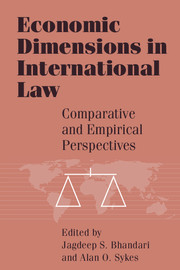Book contents
- Frontmatter
- Contents
- Preface
- Introduction: Economics and international law
- 1 The economics of the most favored nation clause
- 2 The economics of “injury” in antidumping and countervailing duty cases
- 3 The economics of “injury” in antidumping and countervailing duty cases: A reply to Professor Sykes
- 4 Innovations in support of the unitary injury test in U.S. unfair trade cases
- 5 The free trade–fair trade debate: Trade, labor, and the environment
- 6 International conflict and coordination in environmental policies
- 7 Market modernization of law: Economic development through decentralized law
- 8 Toward a positive theory of privatization: Lessons from Soviet-type economies
- 9 New stories on exchange rate policies in transition
- 10 Is deposit insurance inevitable? – lessons from Argentina
- 11 The market for migrants
- 12 The interplay of liquidation and reorganization in the bankruptcy systems of Canada and the United States: The role of screens, gatekeepers, and guillotines
- 13 International political economy approaches to international institutions
- 14 The trade effects of domestic antitrust enforcement
- 15 The Hartford Insurance Company case: Antitrust in the global economy – welfare effects and sovereignty
- 16 Recognition of foreign judgments as a trade law issue: The economics of private international law
- 17 Externalities and extraterritoriality: The law and economics of prescriptive jurisdiction
- Index
13 - International political economy approaches to international institutions
Published online by Cambridge University Press: 05 December 2011
- Frontmatter
- Contents
- Preface
- Introduction: Economics and international law
- 1 The economics of the most favored nation clause
- 2 The economics of “injury” in antidumping and countervailing duty cases
- 3 The economics of “injury” in antidumping and countervailing duty cases: A reply to Professor Sykes
- 4 Innovations in support of the unitary injury test in U.S. unfair trade cases
- 5 The free trade–fair trade debate: Trade, labor, and the environment
- 6 International conflict and coordination in environmental policies
- 7 Market modernization of law: Economic development through decentralized law
- 8 Toward a positive theory of privatization: Lessons from Soviet-type economies
- 9 New stories on exchange rate policies in transition
- 10 Is deposit insurance inevitable? – lessons from Argentina
- 11 The market for migrants
- 12 The interplay of liquidation and reorganization in the bankruptcy systems of Canada and the United States: The role of screens, gatekeepers, and guillotines
- 13 International political economy approaches to international institutions
- 14 The trade effects of domestic antitrust enforcement
- 15 The Hartford Insurance Company case: Antitrust in the global economy – welfare effects and sovereignty
- 16 Recognition of foreign judgments as a trade law issue: The economics of private international law
- 17 Externalities and extraterritoriality: The law and economics of prescriptive jurisdiction
- Index
Summary
International institutions are once again at the center of the substantive and intellectual agendas of international politics. Practitioners are asking tough questions about reformulating existing institutions such as NATO or the United Nations and its agencies; old institutions like the GATT are being transformed into new ones like the WTO; and completely new institutions like NAFTA, APEC, and LRTAP are being created. At the same time, the relevance and importance of international institutions have returned to the center of intellectual debate for the first time in a generation. Realists are renewing their claims that institutions are irrelevant or else derivative of more fundamental issues of power politics; liberals are renewing claims about the central role of institutions in the governance of existing and prospective international issues.
This debate over the importance of international institutions has multiple causes, practical and intellectual. The end of the cold war reopened a set of institutional issues that had been frozen in the bipolar division of international politics and created possibilities for reorganizing our international security and economic affairs. In addition, changes in technology and interdependence have resulted in new issues such as the global environment and increased the significance of long-standing issues such as trade. While these substantive concerns have made the intellectual debate more important, its origin lies equally in the social science-wide return to institutional analysis. Some three decades after an earlier descriptive institutionalism was overthrown by a move toward behavioralism, the social sciences are recapturing an analysis of institutions that had been significantly neglected in the meantime.
- Type
- Chapter
- Information
- Economic Dimensions in International LawComparative and Empirical Perspectives, pp. 477 - 512Publisher: Cambridge University PressPrint publication year: 1998
- 2
- Cited by

